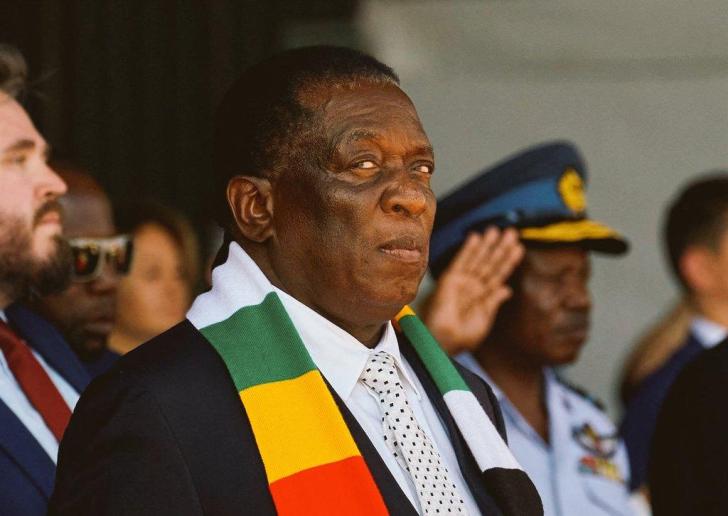News / National
Mnangagwa's US$3bn begging bowl still 'empty'
12 Sep 2024 at 09:56hrs |
0 Views

Zimbabwe faces a severe challenge in mobilizing sufficient resources to meet its $3 billion humanitarian assistance target aimed at addressing the needs of millions of food-insecure citizens. The country continues to grapple with a significant funding shortfall despite the government's ongoing efforts and international support.
In April, President Emmerson Mnangagwa declared a national disaster in response to the severe hunger caused by an El Niño-induced drought. This declaration underscored the urgency of addressing the country's food crisis, exacerbated by reduced rainfall and subsequent agricultural failures.
During the World Food Programme (WFP) and Korean assistance signing ceremony in Harare, WFP Deputy Country Director Billy Mwiinga highlighted the substantial gap in funding. The recent agreement with the Korean government, valued at $1 million, is a positive step, but there remains a considerable shortfall. The WFP estimates that approximately $150 million is needed to address the food insufficiency gap affecting 1.6 million people out of Zimbabwe's 15 million population.
"We are targeting to assist at least 1.5 to 1.6 million people, and we require around $150 million for the lean season. Unfortunately, we still face a significant resource deficit," Mwiinga stated.
The government has initiated the second phase of the Blitz Grain Distribution programme, which aims to supply food to those in need. According to Information, Publicity, and Broadcasting Services Minister Jenfan Muswere, 31,889.85 tonnes of grain have already been distributed, with an additional 139,854.94 tonnes expected between August and October.
Minister Muswere also announced the Urban-Cash-for-Cereal Programme, which is currently underway to assist urban beneficiaries. Despite these efforts, the need for further resources remains critical.
Public Service, Labour, and Social Welfare Deputy Minister Mercy Dinha confirmed that while there has been international assistance, including recent donations from Belarus and China, the government is still actively seeking more support.
Korean Ambassador to Zimbabwe Park Jae Kyung emphasized that his country's donation will significantly aid Zimbabwe in managing the impact of climatic shocks. "The Korean embassy, WFP, and the government will work closely to ensure effective distribution of food to vulnerable communities," Park said.
India has also contributed to the humanitarian effort, recently dispatching 1,000 metric tonnes of rice to Zimbabwe. The Indian External Affairs Ministry underscored this aid as part of its commitment to South-South cooperation and solidarity with Africa.
The El Niño phenomenon has resulted in severely reduced rainfall, impacting crop yields and water availability. The government initially estimated a need for $2 billion to address the hunger crisis but later revised this figure to $3 billion. Current estimates indicate that 7.7 million people, or 51% of Zimbabwe's population, require food assistance.
As Zimbabwe continues to face these formidable challenges, the combined efforts of the government, international agencies, and donor countries will be crucial in bridging the funding gap and mitigating the effects of the ongoing food crisis.
In April, President Emmerson Mnangagwa declared a national disaster in response to the severe hunger caused by an El Niño-induced drought. This declaration underscored the urgency of addressing the country's food crisis, exacerbated by reduced rainfall and subsequent agricultural failures.
During the World Food Programme (WFP) and Korean assistance signing ceremony in Harare, WFP Deputy Country Director Billy Mwiinga highlighted the substantial gap in funding. The recent agreement with the Korean government, valued at $1 million, is a positive step, but there remains a considerable shortfall. The WFP estimates that approximately $150 million is needed to address the food insufficiency gap affecting 1.6 million people out of Zimbabwe's 15 million population.
"We are targeting to assist at least 1.5 to 1.6 million people, and we require around $150 million for the lean season. Unfortunately, we still face a significant resource deficit," Mwiinga stated.
The government has initiated the second phase of the Blitz Grain Distribution programme, which aims to supply food to those in need. According to Information, Publicity, and Broadcasting Services Minister Jenfan Muswere, 31,889.85 tonnes of grain have already been distributed, with an additional 139,854.94 tonnes expected between August and October.
Public Service, Labour, and Social Welfare Deputy Minister Mercy Dinha confirmed that while there has been international assistance, including recent donations from Belarus and China, the government is still actively seeking more support.
Korean Ambassador to Zimbabwe Park Jae Kyung emphasized that his country's donation will significantly aid Zimbabwe in managing the impact of climatic shocks. "The Korean embassy, WFP, and the government will work closely to ensure effective distribution of food to vulnerable communities," Park said.
India has also contributed to the humanitarian effort, recently dispatching 1,000 metric tonnes of rice to Zimbabwe. The Indian External Affairs Ministry underscored this aid as part of its commitment to South-South cooperation and solidarity with Africa.
The El Niño phenomenon has resulted in severely reduced rainfall, impacting crop yields and water availability. The government initially estimated a need for $2 billion to address the hunger crisis but later revised this figure to $3 billion. Current estimates indicate that 7.7 million people, or 51% of Zimbabwe's population, require food assistance.
As Zimbabwe continues to face these formidable challenges, the combined efforts of the government, international agencies, and donor countries will be crucial in bridging the funding gap and mitigating the effects of the ongoing food crisis.
Source - newsday
Join the discussion
Loading comments…



























